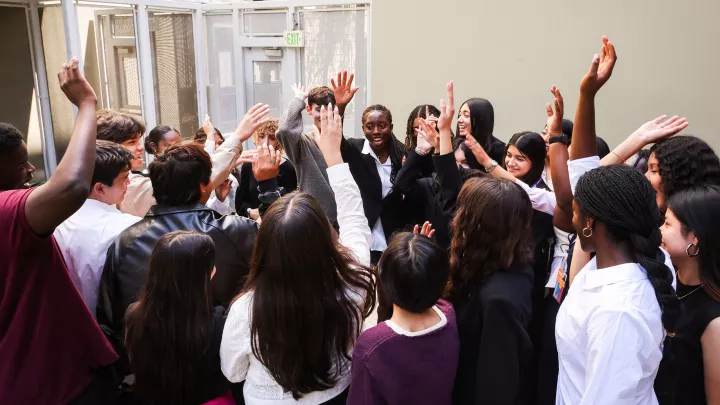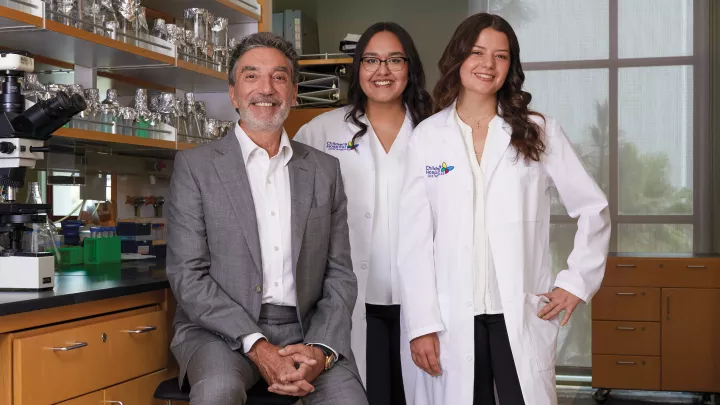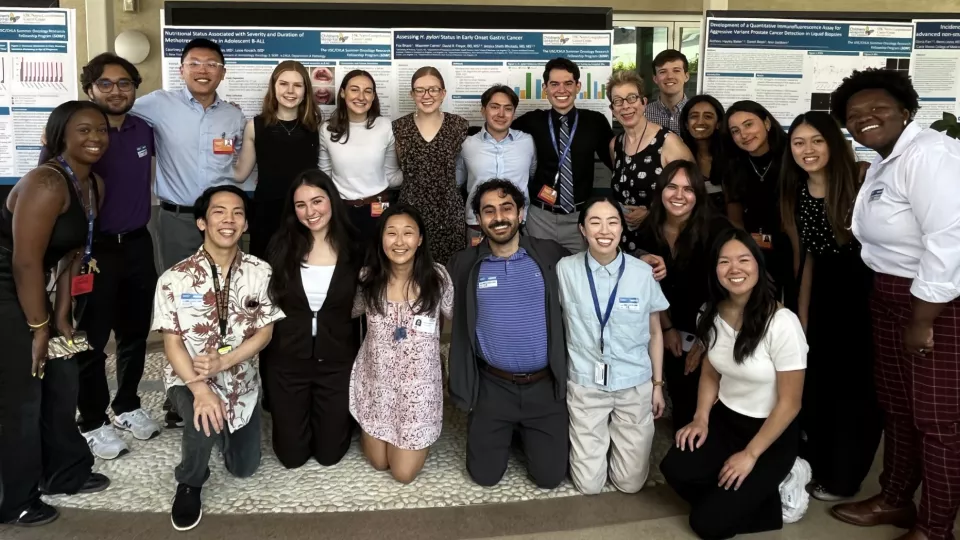
The 2024 Summer Oncology Research Fellowship Program students pose with Dr. Anat Erdreich-Epstein and Project Associate Daikota Barnett during their poster session.
Medical Students Explore a Future in Research Through the Summer Oncology Research Fellowship Program
For many students, summer break represents an opportunity for relaxation and carefree vacations. But for the medical students taking part in the USC/CHLA Summer Oncology Research Fellowship (SORF) Program, summer means something more.
This program, which has existed for over 45 years and is supported by funding from the National Institutes of Health (NIH) and several donor organizations, welcomes applications from students interested in research who will soon be on their summer vacation between years in medical school. The program’s goals are to interest these students in pursuing a career as a physician-scientist conducting cancer research and to help them achieve that.
Selected students are matched with faculty mentor researchers from Children’s Hospital Los Angeles and the Norris Comprehensive Cancer Center at USC’s Keck School of Medicine according to their research interests and previous experience.
This summer’s cohort of participants just finished the program and have presented the findings from their projects to USC and CHLA faculty in a series of three virtual meetings.
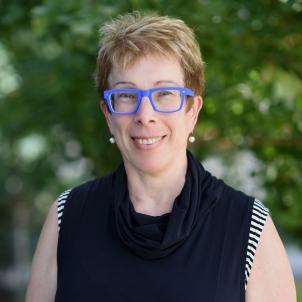
“They really all do amazing work, especially considering that the summer is so short,” says Anat Erdreich-Epstein, MD, PhD, the physician-scientist who leads the Summer Oncology Research Fellowship Program. Dr. Epstein specializes in treating pediatric brain cancers in her clinical work in CHLA’s Cancer and Blood Disease Institute, and conducts research in her lab, the Erdreich-Epstein Laboratory, that focuses on the biology of brain cancers. She understands firsthand the value of having an in-depth understanding of both clinical care and research.
“I truly believe that as smart as physicians are and as smart as scientists are, having somebody with both hats on their head is hugely helpful,” Dr. Epstein explains. “They think differently and bring unique insights, as they are able to speak both languages at the same time.”
A challenging path and a need for mentors
Dr. Epstein explains that the number of physician-scientists in the U.S. is dwindling. It is a challenging career path that becomes more difficult when you don't have helpful mentors. Also, medical students interested in research are often encouraged to pursue clinical, rather than laboratory research. While there are many types of research, and all types are needed to advance and improve medical treatments, one of the main goals of the Summer Oncology Research Fellowship Program is to specifically spark interest in laboratory research. “We're looking for students who have that fire burning in them to pursue science, and they will do everything they can to succeed, especially if you help them.”
This year’s projects were focused on laboratory work, clinical projects, computational biology, and AI. “We have had more laboratory science projects this year than in the past,” Dr. Epstein says. “We had 11 of the 20 students in the program doing hands-on laboratory research, which was really awesome.”
The students’ projects spanned a wide range of unique oncology-related topics. For instance, one project experimented with training an AI model to use scans of patients with cancer and data from molecular analyses to help predict their clinical outcomes more accurately. Another project utilized a zebrafish model to explore the molecular pathways involved in a rare type of childhood cancer that has a novel mutation.
Dr. Epstein found it impossible to pick a favorite. “All the students did an awesome job,” she says. And they want to keep going. After the summer, program participants may continue working on their projects part-time to finish their projects, publish, and present at scientific conferences. Dr. Epstein says that like last year, many of this year’s students are taking advantage of that opportunity. “The fact that the NIH is now supporting this aspect of the program is a huge benefit to the students,” she explains.
Dr. Epstein points out that through this work, program participants and their research mentors end up inspiring each other. She encourages any interested researchers at CHLA to take part in the program as mentors in the future. “I just ran into two of our mentors from this summer and they were so excited to tell me how excellent their students were and how much they appreciated the experience,” she says.
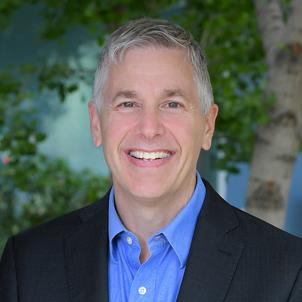
James Amatruda, MD, PhD, Chief of the Division of Pediatric Hematology-Oncology, Director of the Cancer and Blood Disease Institute and Alfred E. Mann Family Foundation Chair in Cancer Research, echoes these sentiments. “I had the privilege of hosting a student in the program for the first time, which was very rewarding for everyone in our lab,” he says. He recently spoke to the SORF participants during a virtual presentation of their work. “I have to thank you all because you inspire us. To really engage in the important questions, to bring your brilliance and talents, and to learn new things—it's a reminder to all of us of what can be done with effort and passion.”
Collaborators in and out of the lab
Dr. Epstein emphasizes that there is much more to the program than just the students’ research projects. They also visit scientific centers of excellence and take part in educational seminars covering topics in career development, research communication, oncology and responsible conduct of research. “This summer, we had a lot of career development seminars in particular, and the students told me how much they appreciated those opportunities,” Dr. Epstein says.
The students also have the chance to meet with faculty, trainees and cancer survivors, and develop their skills in producing scientific reports, creating posters and delivering oral presentations. During the SORF poster session, undergraduates taking part in USC’s Programs in Biomedical and Biological Sciences (PIBBS) program, students involved in CHLA’s Samuels Family Latino and African American High School Internship Program (LA-HIP) led by Mark Frey, PhD, and members of CHLA’s George Donnell Society for Pediatric Scientists were in attendance and had the chance to interact with the poster presenters. “There was a really amazing interaction between all of the various students and it was a great opportunity for peer mentoring,” Dr. Epstein explains. Students in the Summer Oncology Research Fellowship Program later attended the LA-HIP students’ presentations of their work.
Events like the poster session are made possible thanks to Project Associate Daikota Barnett. She works to connect students with their research mentors and organize all of the seminars and excursions for program participants, among other responsibilities.
Barnett feels honored to be a part of making the program happen. “A lot of people don’t know exactly what they want to do or what specialty they want to pursue in their first year of medical school, and I feel like this program really helps them to understand where they want to go,” she says.
Making the most of summer
The students in the program are also committed to supporting each other. Beyond their research, they often organize social activities to spend time with one another. This year’s cohort grew exceptionally close. “This summer’s group of students were not just smart and productive researchers, they also gelled together socially really well,” Dr. Epstein explains. “In the evenings and on weekend, they went to the beach, they organized hikes. They just did things together without being prompted, which was really nice to see.” Dr. Epstein was even invited to join the students for a weekend hike and sushi dinner.
Derek Alpert, President of Concern Foundation, one of the donor organizations that supports the Summer Oncology Research Fellowship Program, also continued his tradition of inviting all of the program’s students to attend the foundation’s annual Block Party. This event was held on the historic backlot of Paramount Studios Hollywood and represented another unique bonding experience for program participants.
Dr. Epstein is thrilled with how successful this summer’s program cohort was. “This has been a remarkable summer,” she said to the program participants after they presented their work. “You’ve done amazing work. You connected as a group socially, which was really wonderful. This is exactly what I would love our summers to look like every year.”

